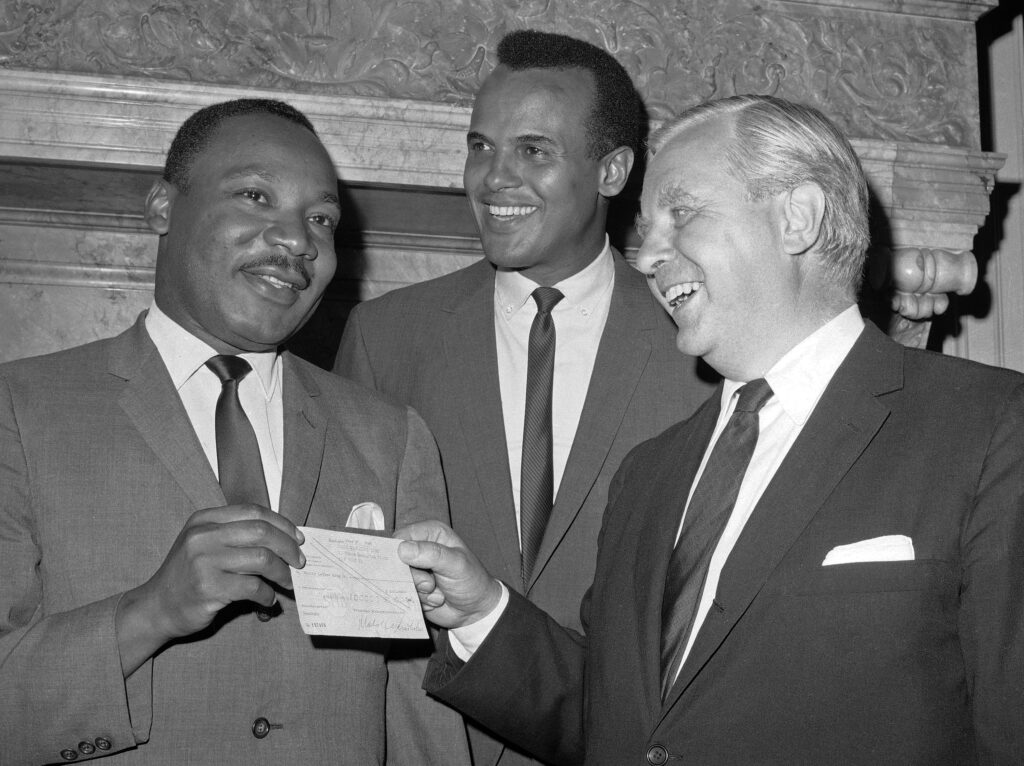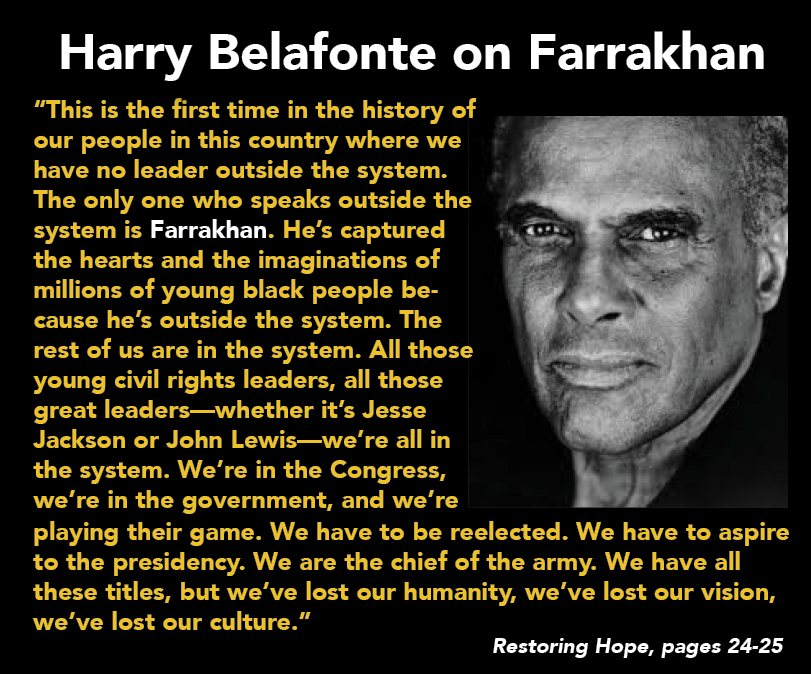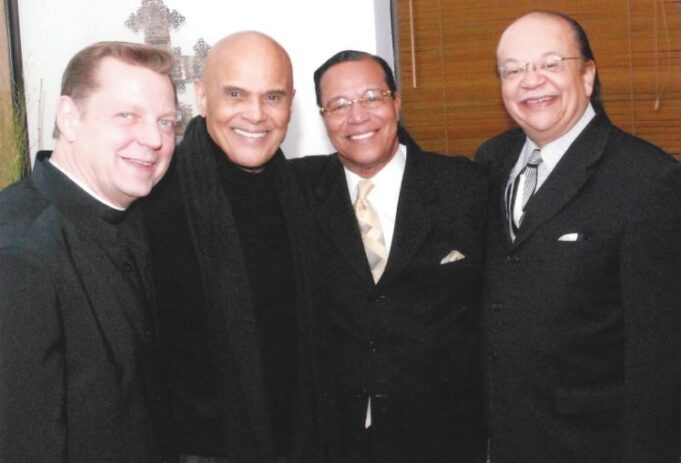“This is the first time in the history of our people in this country when we have no leader outside the system. The only one who speaks outside the system is Farrakhan. He’s captured the hearts and the imaginations of millions of young Black people because he’s outside the system. The rest of us are in the system.
All those young civil rights leaders, all those great leaders—whether it’s Jesse Jackson or John Lewis—we’re all in the system. We’re in the Congress, we’re in the government, and we’re playing their game. We have to be reelected. We have to aspire to the presidency. We are the chief of the army. We have all these titles, but we’ve lost our humanity, we’ve lost our vision, we’ve lost our culture.” —Harry Belafonte (1927–2023)
The world mourned the passing, at 96, of the activist and icon Harry Belafonte. Among the many honors that poured in were tributes from presidents Biden, Obama, and Clinton of the United States, the leaders of African and Caribbean nations, and United Nations Secretary-General António Guterres, who said Mr. Belafonte, reflecting the spirit of many leaders, “devoted his life fighting for human rights and against injustice in all its forms.”

Every Black organization and leader from the NAACP, the National Urban League, and SNCC to the Congressional Black Caucus and the United Negro College Fund expressed their condolences. The Honorable Minister Louis Farrakhan and the Nation of Islam dedicated a special 48-page commemorative issue of The Final Call (Vol. 42 No. 31) to the life and legend of Harry Belafonte.
All over the world the high and mighty shared their memories of a true justice warrior, yet one segment of the “civil rights” establishment was blatantly silent. None of the major Jewish organizations even acknowledged Belafonte’s passing, offering not a single statement of condolence or even a gesture of respect to honor the life of a man who so publicly fought against racism and anti-Semitism at every turn. In unison and apparent collusion, so-called Jewish leaders who claim to be dedicated to “civil rights” simply ignored the life and accomplishments of Dr. Martin Luther King’s right-hand man.
So, why have the Jewish organizations and leaders chosen to commit this supreme act of disrespect to Belafonte and the Black community in their hour of mourning?
In his 96 years, Belafonte was unquestionably an ambassador to the Jewish people. His paternal grandfather was a Dutch Sephardic Jew, and he was three times married, twice to Jewish women. He performed in Israel several times and once quipped that he was “the most popular Jew in America” after his 1957 recording of the Hebrew classic “Hava Nagila.”
He spoke often of Jewish suffering, and he was honored with awards by many Jewish organizations. The Anti-Defamation League once gave Belafonte a humanitarian award, but its current leader Jonathan Greenblatt and his predecessor Abraham Foxman said nothing at his death. The American Jewish Congress, Hadassah International, Yeshiva University, and National Council of Jewish Women all gave Belafonte humanitarian awards, yet none of them would offer a single word of honor for any of those 96 years that the United States president said were dedicated to “breaking barriers and bridging divides.”

American Israel Public Action Committee (AIPAC)—nothing; Simon Wiesenthal Center—nothing; American Jewish Committee, World Jewish Congress, Conference of Presidents of Major American Jewish Organizations—nothing, nothing, nothing. Belafonte performed in Israel and sang its praises, yet at his death there was only steely silence from Israel’s leader Benjamin Netanyahu and his government.
A closer look into Belafonte’s multi-generational history with the Jewish world provides a clearer view of why these so-called Jews chose to “anti-Semitize” a beloved Black leader. For many years the mainstream media with its heavy Jewish dominance has suppressed the fact that Belafonte became one of the most incisive critics of many “causes” dear to Jewish hearts, such as racial integration—the Jewish-financed agenda for Black people. Certainly, Jews must cringe when Belafonte remembers the very last thing the Rev. Dr. Martin Luther King said to him:
“You know, we fought long and hard for integration … But I tell you, Harry, I’ve come on a realization that really deeply troubles me. I’ve come to the realization that I think we may be integrating into a burning house.”
There is no doubt that King’s “burning house” revelation and his murder soon after caused Belafonte to re-examine the very foundations of the civil rights movement and the so-called Jews that had been its most ardent supporters and allies. Over the years Belafonte recounted a few experiences that very likely sobered his assessment of the people he once believed to be God’s “chosen.”
A Jewish attorney named Stanley Levison worked his way into King’s inner circle, where he made crystal clear the Jewish objective while editing King’s 1958 book “Stride Toward Freedom.” According to FBI and Martin Luther King, Jr., author David Garrow, Levison counseled King “against including a segment on Black self-improvement and urging that he add a section on registration and voting … .”
This surreptitious manipulation of King’s guidance to his own people reflects the longtime Jewish hostility toward Black self-help programs like those of Booker T. Washington, Marcus Garvey, and the Most Honorable Elijah Muhammad.
In 2013, Belafonte received the NAACP’s highest honor, the Spingarn Medal, named after the Caucasian Jewish man who founded, financed, and misguided the NAACP. As a “leader of negroes” Joel Spingarn was wholly dedicated to the notion of what he called “non-economic liberalism”—a philosophy that steers Blacks far away from an economic self-help strategy for their upliftment.
Belafonte ultimately saw the pure hypocrisy in Jews financing a “non-economic” course for Blacks but pursuing a business-centered wealth-building strategy to achieve their own Jewish independence, and he became one of the harshest critics of “integration.” In 1996 he told Dr. Cornel West that: “I think that we are in the greatest jeopardy we have ever been in … I see a whole people being wasted and being denied and suffocated.

I think black culture…is under the greatest onslaught of negativity that has ever existed. [W]e have been integrated out of culture. And those who are successful in that world have no sensitivity or commitment to this loss and this pain … So I tell you, yes, I feel that we have lost an awful lot. And we have done it in the name of integration.”
This had to be a major blow to Jews, who were in that very moment defending the virtues of the historical Black–Jewish relationship then under a major assault. Belafonte was in effect reflecting a pillar of the Nation of Islam Teaching, which unambiguously declares: “WE BELIEVE that the offer of integration is hypocritical and is made by those who are trying to deceive the black peoples into believing that their 400-year-old open enemies of freedom, justice and equality are, all of a sudden, their ‘friends.’” [What the Muslims Believe, Point Number 9]
Similarly, Belafonte took aim at the corrupted political system in America and the Black-vote-dependent Democrat Party, which to him seemed to be a dead end for Black aspirations:
“If anybody had told me thirty years ago when this [civil rights] campaign was on that we’d wind up [with high political offices] and we would not be able to make a vast difference in how black people are experiencing life, I’d have said you’re smoking dope.”
Clearly, Belafonte’s integrationist political outlook had changed. In 2005, at a Congressional Black Caucus Town Hall Meeting on Poverty (sitting beside Democrat Senators Barack Obama and Hillary Clinton), he eloquently recounted the paltry yields from 40 years of the promises of Black politics and then made this audacious observation:
“I guess part of the reason I’m here is to really look through the ravages of the Democratic Party and see if anything is really worth salvaging!” With the Democrat party awash with Jewish money, Belafonte’s comments again sent shockwaves through America’s Jewish elite.
Belafonte did not restrict his political critique to Democrats. In 2002, he blasted the Republican administration of George W. Bush and its Israel-driven wars in the Middle East. Belafonte publicly called Bush “the greatest terrorist in the world” and said the unsayable—that the Iraq war “was all about oil.” But most offensive to the Jewish neo-con war-mongers that pervaded Bush’s inner sanctum was Belafonte’s condemnation of Secretary of State Colin Powell and National Security Advisor Condoleezza Rice as “house slaves [who] served their master well.”
Strangely, even though no Jews were targeted by Belafonte, the Jewish Anti-Defamation League’s leader Abraham Foxman stepped in to chastise the Black man, ordering him to “refrain from references to slavery,” which Foxman said, “demean and degrade and contribute nothing constructive to the serious and important policy debate in which our nation is currently engaged.” Belafonte exploded at Foxman:
“Why are references to slavery demeaning?… Slavery is an important part of this nation’s history. An absolutely critical part of any analysis that is done in defining black Americans … This nation has never really confronted, debated or had any fair exchange on this issue of slavery. We went from the strict confinement of physical slavery—with chains, shackles and whips—to the spiritual and psychological chains of slavery in the following century of legal segregation in this country.”
In Part 2 in an upcoming edition: Jews are angered as Harry Belafonte becomes an international activist. Nation of Islam researchers uncover his early run-ins with Jewish power.
Tingba Muhammad is a researcher and citizen of the Nation of Islam. Visit the NOI Research Group online at www.noirg.org.














